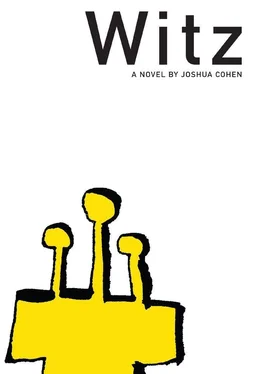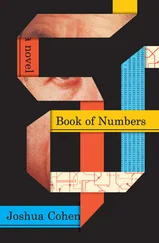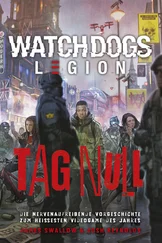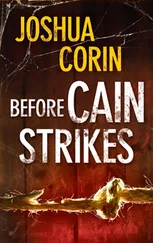Joshua Cohen - Witz
Здесь есть возможность читать онлайн «Joshua Cohen - Witz» весь текст электронной книги совершенно бесплатно (целиком полную версию без сокращений). В некоторых случаях можно слушать аудио, скачать через торрент в формате fb2 и присутствует краткое содержание. Год выпуска: 2010, Издательство: Dalkey Archive Press, Жанр: Современная проза, на английском языке. Описание произведения, (предисловие) а так же отзывы посетителей доступны на портале библиотеки ЛибКат.
- Название:Witz
- Автор:
- Издательство:Dalkey Archive Press
- Жанр:
- Год:2010
- ISBN:нет данных
- Рейтинг книги:3 / 5. Голосов: 1
-
Избранное:Добавить в избранное
- Отзывы:
-
Ваша оценка:
- 60
- 1
- 2
- 3
- 4
- 5
Witz: краткое содержание, описание и аннотация
Предлагаем к чтению аннотацию, описание, краткое содержание или предисловие (зависит от того, что написал сам автор книги «Witz»). Если вы не нашли необходимую информацию о книге — напишите в комментариях, мы постараемся отыскать её.
Meanwhile, in the not-too-distant future of our own, “real” world, another last Jew — the last living Holocaust survivor — sits alone in a snowbound Manhattan, providing a final melancholy witness to his experiences in the form of the punch lines to half-remembered jokes.
Witz — читать онлайн бесплатно полную книгу (весь текст) целиком
Ниже представлен текст книги, разбитый по страницам. Система сохранения места последней прочитанной страницы, позволяет с удобством читать онлайн бесплатно книгу «Witz», без необходимости каждый раз заново искать на чём Вы остановились. Поставьте закладку, и сможете в любой момент перейти на страницу, на которой закончили чтение.
Интервал:
Закладка:
Miriam the Guide with her Group passing these houses also used as shuls and as shtibls, as places of worship, as corners of worship, as worshipnooks, or prayercracks, please notice — how their roofs sag under worries, stooped under the weight of the heaven the weights of the heavens their septenary sum; past the houses sagging under their roofs: thatched, timberframed, Miriam says, unframed, like here without door…knockknock, this poor quality wood, wormwood, turdwood, rotboard this collapse: these houses stoopshouldered, with no door in their doorways, openmouthed, how they’re gaping, stairtongue, step the buds, what’re they saying, calling out sore whose name or the wind through their windows shattered though shut under lids of dust under lashes of wind and dust shattering blindness, fever, and hunch; sgraffitod façades scumbled to innards, viscera, a decomposition from without to within as ashes to ashes to…Miriam the Guide with the Group, with her next Group, the Group always next, how she staggers them forward they’re staggering ever forward on over the Land — sagging under the weight of the houses humpbacked, so burdened they follow the passage parsing southwest toward cool noon, slowly manage the wide street, which is actually named Wide Street, which intersects Narrow Street (never doubt home’s street names again: how the Market’s on Market Street, the Synagogue’s on Synagogue Street, the Cemetery’s on…no, it’s on Butcher’s Street, sorry, named for the shop at its end — got you there, you’ve got to stay on your toes…ten, the quorum hoard of your wandering feet), which leads into and out of the Ghetto, leading them into and out of the city itself, the village, the town, Polandland’s proper limits coming toward the Square now as Wide Street as it widens itself into the Square that’s called a Square even though it’s a circle, and then — it’s enough: a street storelined, its Square shoplined, too, overpriced, why not splurge, it’s over so soon; and then, only a block more…a few blocks beyond the Square, north, east, if here there be blocks, even (grid superimposed upon grid, cycles atop cycles, clocking, a staggering mumble of settle after all’s razed to very foundations, then rebuilt to fallover again), Long Street, Short Street, she leads group after group, guides group after group after group, umbrellas them and herself from the wind and the rain and the snow a few steps more just a step, and it’s darker, quieter, it’s…a Quarter, says Miriam, this is a Quarter — shush silence, isn’t it heymisch? though Polandland’s been divided into many more than mere fourths…though the streets might’ve been straightened out (like one might shake out a sheet, wave out a tablecloth in preparation for a bridegroom’s banquet, the chatanchazzan’s drinkwindy, unwitnessed tisch), by the best efforts of what we call modernity, of an involved government and public goodwill, there are still traces, in the way their feet want to walk, in how their hands need to reach to touch and to hold, of the older ways and the winding ways, the natural course of decomposition, the unchanged change of decay leftalone, gnarled spines, splintered ribs, streets ghosting their own olden roads through newer guesthouses, deadroutes trod heavy through livingrooms, deadrooms, and over a light sleeper a stumble then out through their wardrobes, empty, the walls.
At the border, here, the bruised, bloated joint, perpendicular to — the Quarter seems to genuflect to the Square, prostrating itself at this estrangement of knee, this arterial way…Wide Street intersecting Narrow Street, only to become on its other side Ghetto Street’s its name, set apparently straight, with regard to the lean of its living, though with an underlying windingness bisecting the clocked circle surrounding with the secret of its holier, unhanded time — to flow its river of homes, rushed people and the livestock they resemble into an opposite street, bounding, containing, River Street it’s called far toward the back of the Quarter, unwalled to tumbledown at their intersection in neglect, to decay; there to bridge with its loosened cobbles the most polluted swell of this river, whatsoever its name if it isn’t just River, formerly Water: this is the world, roundsmall or it was, and how everything they’d want or need, everyone they’d ever know, would exist inside its circumference, had been encircled in bondage, encycled, bound up in one; this tightness, the throatconstriction, the dizzying breath of containment, overwhelms many, all, the market, the marketed package…and so Miriam takes it upon herself to assure: what you’re feeling is normal, to be expected, and them, this is fascinating stuff…O I didn’t know that, did you, honey, I didn’t — reassured as she guides them, whichever them, with each group the same, these undifferentiated, unindividuated, up shortcuts, switchbacks long around, as handeddown father to son, generationally hand to mouth, dor l’door: mouth to ear, out of mind to its foot in through the alleys and courtyards, Baroque culs-de-sac, rococo loops, maniacally fine and fripperant turns…
We’re heading back to the Square now, says Miriam, for the clock…about to ring us the hour.
You shouldn’t miss this!
A mustdo — is everyone ready?
Let’s all stick together. As much as she sticks to the script.
No use getting to know them, Miriam, no use to even think of them as them — and not just as It, the riveredabout.
And so to begin again, again then all over.
An Affiliated bleeds in a bleeding memory, wilts in a willing memory — dies in a dying memory…dies.
In the Square
The Sandersons arrive in the Square, having passed through innumerable subsidiary squares on their way, through intersections intersecting pedestrian malls, through stretches of municipal openness buttressed by statuary and somber monuments to the most important who cares (Miriam’s stretching, herself — and the feet, they hurt so), that, too, and the Ghetto’s constriction, the poisonous suck, the thin wick through which passes the hour’s glass sand — arriving finally in front of the Clock, just moments prior to its sounding the knell of our noon in twelve tones, halved hollow. Here and waiting, they behold the Tree, which they’d previously known only in photographs, from films, promises, descriptions of print and the mouth; how it fulfills all expectations, exceeds in that it’s “simply fabulous,” though “amazing” is preferred (upon the forms they’ll later fill out — help us help you to force you to fill: our trip was amazing, we had an amazing time, everything was “simply amazing”); earlier, they’d toured another tree, the other Tree, rooted in a lesser as mirrored square rooted across the river from this square, the Main Square, Old Town’s, that’s the New’s: the tree here’s watered larger, it’s historyswollen, greater, obviously the more important of the two trees, the most, they didn’t have to be told after all — despite, even its plaque’s larger, more luminously polished; as for its ornaments, the other tree can’t hold a candle…
Here, everyone holds an umbrella.
This is the openedwide heart of everything, and everything is around this, in pulse — around the Church that is, its cruciform insides, and its Affiliated, its mensch, his own heart almost too open; its death. Mister Sanderson fusses with his jackets (slicker over nylon windbreaker, in layers), a zipper’s caught, he struggles to find the catch, zip himself up again against the bleat of the cold. Of course, Miriam says, many cities, many towns and villages have not rebuilt their Squares. All roads there lead to all roads there and road, not to expectation: the early morning/late night nakedness of a Square, paved with — how do you say, she asks herself, gnaws a lips, for their edification, how you say — tongue, that’s it, that’s the language, that it paves with bare rotted tongue, its buds suckling toes, buds roiling underneath toes, boiling, burning…keep moving, step on: the whole Group’s more pillow than head this morning, the wakeup cock had cawed too early for most, betraying, cuckoo; they’re overwhelmed, too much of not enough, sites of time, landmarks timemarks timelands, monumental disasters erected to this battle, this fire, this burning, whose auto de fé tragic death. Advertisements on the martyred façades, have been pasted over windows, nailed over doors or wherever doors should be, should’ve been they take paper for things, offer things for paper (the only falsity here, or one of the only: selling souvenirs, they’re recommending purchases if only to spite), signs & wonders ask for paper with number, with numbers, paper with faces and face; pay their way out of death’s debt, is the thought, using as guarantee the images of their executioners famed. This way, this way. Mind your step, mind your pockets, your mind, your personal possessing possessions. The Sandersons with their Group pass under the Tree, heldover for them cheerbright, starry and twinkling, toward the Clock’s clocks and their toll as exacting as promised, leaving behind them a husband whose nobody knows, maybe not even him; standing high on the exposed roots of the growth, leaning against its trunk to search for his wife, whomever’s if not already a widow, the Law orders him off, nightly takes him away, he isn’t seen or heard from again, his wife either, if ever she was. A shocking bustle of black forms as if spilled from the river, its ink: the tap tap tap of a nightstick, worming as if sexually from its wielder’s disintegrate shadow, a pain palmmuffled, fistfaced. A helmet invasion, segmentally regiment with how many limbs. Everyone turns, then turns yet again. Unrunged, standing expectant in silence. And then, suddenly — of all things a gazelle, if you can believe it, leaps up from an open sewer, clears the canopy of Tree and of houses, maps a vast arch over the Square, naturally calm, like it’s risen to bow, appearing even, couldn’t be, to nap in leap amid the weather and with groups’ umbrellas lowered not as trees bent from the ascent but as flags hung low in a respect that’s spontaneous and yet, also brave — the gazelle’s own arc the umbrella of sky, a rainbow the covenant of colors that mark us as different, and yet all of a shade…not to worry your belief, though, it’s animatronic, in truth that’s its name, on a timer, and Misses Sanderson stares beatifically, points, forefingered heaven — with the scurrying rivered away, forgotten even in spirit, banished, consecrated to thatwasthen, thisisnow…everyone gasps, it’s amazing. What’re we looking at, Mister Sanderson demands still concerned, confused with the turnings around and the oohlings, the ahs, who, he asks, where, I don’t see anything, will someone please tell me, is it over yet, what? He stares openfacedly, a square unto himself in his jaw, in chin’s jutted flat bone, at the sun at its nooning; loudspeakers swell along with the rising, having faded out the Square sounds, the Market Sounds, the prepared Livestock Reel, fading in now a fresh snatch of music, a fan’s fared anew, just the perfect accompaniment this period score: basses surge celli, harps strung tautly with rays of the sun above gliss up and down these winds of every hue and hewing direction — light to the east, dark to the rest, in a flutter…a swirling crescendo to crash, at tessitural height, steepleward pitched, resounding within the upsidedown bell of the Square, stonebottomed the catacombed Church (Mister Sanderson’s missing everything, he’s scared without the Adamic sense of a neck whether to raise it, to let his apple drop for the slitting — he falls to allfours, reversionary, as if he’s being bombed back into an animal, strafed into the bestial again he begins sniffing at the lampposts, commences with a great licking at the territorial plinths). Having reached its apex, the higher meridian, the gazelle then descends, with smoothly greased grace, to land on the opposite side of the Square, to disappear into another sewer open, then shut. At its disappearance, the Clock handed into the face of the Town Hall sounds another hour, clocks another life, strikes twelve times over twelve tones, and how everyone just applauds like their lives might depend on it.
Читать дальшеИнтервал:
Закладка:
Похожие книги на «Witz»
Представляем Вашему вниманию похожие книги на «Witz» списком для выбора. Мы отобрали схожую по названию и смыслу литературу в надежде предоставить читателям больше вариантов отыскать новые, интересные, ещё непрочитанные произведения.
Обсуждение, отзывы о книге «Witz» и просто собственные мнения читателей. Оставьте ваши комментарии, напишите, что Вы думаете о произведении, его смысле или главных героях. Укажите что конкретно понравилось, а что нет, и почему Вы так считаете.












